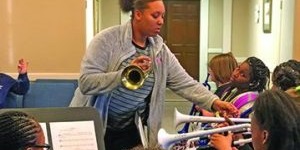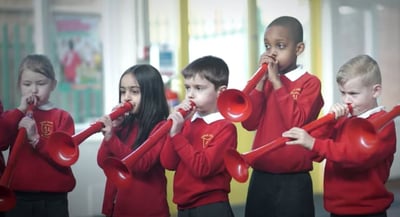Search for topics or resources
Enter your search below and hit enter or click the search icon.

Music classes can look very different depending on the resources and attitudes of the local school’s teachers, administration, neighborhood and culture. Unfortunately, attitudes and economics often frame each child’s music education experience starting in the early years. A negative experience or attitude about music in elementary school can often look like a lack of interest in later years. Conversely, a strong music program in elementary can open doors for students in middle and high school grades because of the strong building blocks placed for them in general music classes.
Even in later years, music education can be severely limited because of a lack of properly performing equipment. Band instruments, for example, might be supplied by the school, possibly to those students who cannot afford to rent or own their own. In many cases, school-owned instruments mean used and worn instruments that are not properly maintained. A badly working instrument is not always immediately noticed so the blame often goes on the poor student for not progressing adequately.
Every teacher has his or her story about a student who lost interest because the student didn’t have access to a good working instrument. For every story, there are two or three that the teacher doesn’t know about. Some students just seem to drop out because they just cannot progress.
pBone Music has stepped forward to give a level of equity for all students in learning music. pInstruments, like pTrumpets, pBones and the pBuzz elementary instrument are well made to withstand the rigors of school use. Made of plastic, the instruments are easy to hold, easy to play and easy to learn. The instruments are affordable so that schools can invest for all children.

There is equity in musical interest as well. The pBuzz, a special instrument for elementary classrooms, is used to teach basic music skills like moving air, making a sound, recognizing pitches, and playing together in an ensemble. These skills are easily transferred to choir, orchestra and band, as are the gross motor skills needed to play any instrument. pBuzz provides for visual, aural and kinetic learning and can be easily included in a progression that includes traditional elementary curriculum.
To find out more about pInstruments and their place in the classroom, check out our collection of free resources.
Rich grew up on Chicago’s south side and attended Marist High School, where he was an active member and drum major of the school’s marching band. He attended Elmhurst College (University), receiving a degree in marketing and music-business. His early career included time at the Chicago Symphony and Ravinia Festival organizations, as well as classes at the Chicago-Kent College of Law. Rich’s career has been dedicated to music education. He has worked closely with educators, professionals, retail businesses and corporations. He has established key education partnerships and has served on the board of directors for several non-profit education organizations. He has provided executive planning and marketing acumen for 21st century companies through Strategic Marketing Management, LLC since 2011. Prior to opening his own firm, he served in key management roles at KHS America, Inc., the Conn-Selmer division of Steinway & Sons, Inc., and United Musical Instruments, all worldwide manufacturers and distributors. He served in the management of the SMART Foundation which provided programs and advocacy support for arts education. He has also authored several publications focused on the arts and education and has served on the boards of non-profit music education organizations.
Topics: